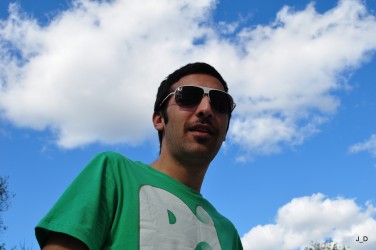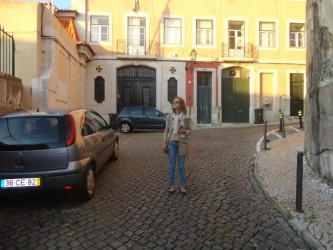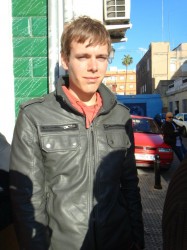 The sample is more than varied: in all, there are almost 400 per year – from different nationalities – at the University of Algarve alone. But there is much more to uniting them than separating them. Examples? well, come to study for Faro it is almost always a resource – and almost never a first choice for these Erasmus students.
The sample is more than varied: in all, there are almost 400 per year – from different nationalities – at the University of Algarve alone. But there is much more to uniting them than separating them. Examples? well, come to study for Faro it is almost always a resource – and almost never a first choice for these Erasmus students.
Javid Jalilzadeh Rahmati, a 29-year-old Iranian, is one such case. A friend told him about the possibility of coming to Europe to study. Being from Iran, his possibilities to travel and have contact with the European Union are limited. Enthusiastic. I wanted to go to study in one of the Nordic countries; ended up in Portugal.
"I filled out the application forms - half, half [ndr: half, half] because at the time I didn't speak a single word of English and even my own language only spoke more or less… [ndr: jokes] – and I chose the Royal College of Norway. But they… they sent me to Portugal”, says Javid, who has been in Portugal since 2009 under the Erasmus Mundus programme.
Anna Zaretskaya, a 24-year-old Russian, is from Moscow, a city with a population larger than Portugal: around 11 million people (!). In the meantime, he lived in France, where he began his Masters, also under the Erasmus Mundus programme. The first impression he had when he arrived at Faro, for the first time, to look for accommodation, it was not (only) bad: it was shock. “When I arrived at the airport and saw the city, very small, the first thing I thought was: what the hell am I going to do for a whole year?”. Her choices to study, explains Anna, did not go through Portugal – much less through Faro. “I wanted to go to France – where I've been – and England, because I already spoke English and French… But apparently everyone had precisely the same idea of going to England and my only possibility was really Faro. I felt miserable when I knew I had to come to Faro. I checked on Wikipedia and thought: 40 thousand people [ndr: number of inhabitants in the city of Faro]? Seriously?”, he says.

On the other hand, there were those who saw virtues in Portugal – or, at least, a not so bad option. “I wanted to study in a country that had water, sea or river, and a pleasant climate. I thought about going to Spain but as my university had a cooperation with the University of the Algarve… Well, I ended up here”, recalls Marita Papagianni, a Greek from Thessaloniki.
For the 22-year-old student, however, the exclusion of parts turned out not to be a disadvantage: considering that her area of study is Forestry and Natural Sciences [department of Landscape Architecture at the University of Algarve (UAlg)], she has in region a very interesting object of study. “The Algarve has a very diverse and very rare autochthonous flora, some of the species can only be found in the Algarve. Unfortunately, UAlg is not very advanced in terms of research in this area and I think that the population itself is unaware of these facts”, says Marita.
Exclusion of parts was also the formula used by Stijn de Munch, a 22-year-old Belgian, to choose a location abroad for her Erasmus programme. The story is simple: Stijn is fond of southern countries and the chances to make his Erasmus outside Belgium were limited to Faro, in Portugal, and to Nordic countries. The choice, therefore, proved to be easy. "On the other hand, why not?" asked Stijn. “After all, it is also a country in Europe – which I had never visited before…”.
Faro? First it's strange, then...

With more or less desire, once landed in the Algarve, there is not much to go around. But the result, in the end, turns out not to be… as – sometimes – expected. After almost a year in Faro and weeks before leaving Portugal for other destinations, Anna Zaretskaya says today that the “unimaginable” happened to her: from the shock she felt when arriving in a tiny city – especially compared to Moscow – to the already more than predictable homesickness for the city of Faro it was a leap.
“I met interesting people (mainly foreigners, I must say), and during this year I never got bored. would not like to live in Faro my whole life, but a year here is very good. I feel like I've been on vacation for almost a year, because the weather is so good and no one is in a hurry to get anywhere…”, says Anna Zaretskaya, already nostalgic.
The Iranian Javid, also almost finishing his master's degree under the Erasmus Mundus program, is in the same tone. “When I arrived here I had no idea about this country. I liked Luís Figo – and that was it. But I really like Portugal – and in the Algarve I feel at home. You, for example, are like my neighbor in Tehran…”, he comments cheerfully.
Future? “Look, I don't know, Portugal is my country now. when i'm in Faro I never miss home – but when I'm traveling in Europe, I always miss home. I adapt to any environment. I go wherever I can get a job…”, says Javid.

Coming from a Mediterranean country, the Greek Marita Papagianni was confident. I thought I knew what was coming. Pure mistake. “The climate is very similar to Greek, but there are many differences in people's mindsets. Anyway, I feel at home but maybe not because of the contact with the Portuguese”, says Marita.
The city of Faro it has, says the Greek student, a certain charm. “Above all, there is an atmosphere in the city that I like. For me it's a beautiful city. It reminds me somewhat of the olden time, but it is also somewhat forward-looking. And there is a lot of potential to explore, namely to attract youth”, says the Greek.
Stijn, a 22-year-old Belgian studying Basic Education at Ualg through the Erasmus program, «came» looking for the Europe that existed in Portugal. Above all, he found Portugal: “I like to live in Faro, in the Algarve, in Portugal. The climate is excellent and, above all, people know how to enjoy life. There is a certain Portuguese way of life that is very different from the Nordic countries”.
How are the Portuguese (or the Algarve) seen by Erasmus?
The question starts by causing an initial discomfort. After all, the reporter is Portuguese. “I don't know if I should say…”, begins one of the interviewees. But little insistence later, the answer comes out. Starting with the positive, naturally: “I honestly like Portugal and the Portuguese – people are completely relaxed,” says Stijn. People seem simply not to want to cause each other problems”, agrees Anna, revealing that “people respect each other much more than in Russia or France”.
Iranian Javid says he feels at home. "The people I see on the street around me aren't mean… I know I can trust them." On the other hand, Iran

iano, who has been living in Portugal for three years, recognizes in Portuguese a “lack of initiative, cooperation” and some propensity for “chico-espertism”. “Somehow, the Portuguese have a tendency to try to get around the law. If there's anything you can escape from…” he suggests.
Arriving here, Marita couldn't agree more. “There are many differences between the Greeks and the Portuguese. For me, the Portuguese are stuck with themselves, introverted. This means that – even if something is wrong – everyone just wants to know about their own lives instead of trying to actually change things. It seems that – for lack of trust or not to commit themselves – the Portuguese prefer not to share their opinions. Quite simply, they take care of your life…”, she says, disillusioned.
And as change is also made by example – albeit negative –, Marita already knows what will change in her life. “When I get to Greece, I will be even more active in my community. If something is wrong, it has to be changed!”. Greece leads the way.


















Comments